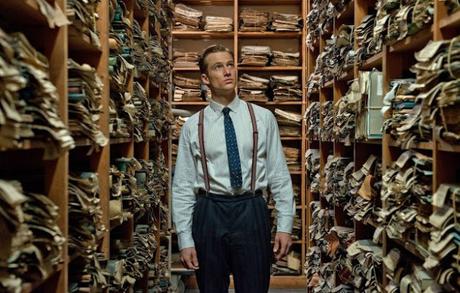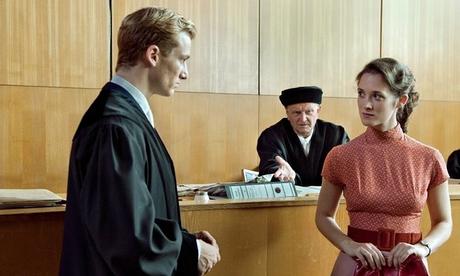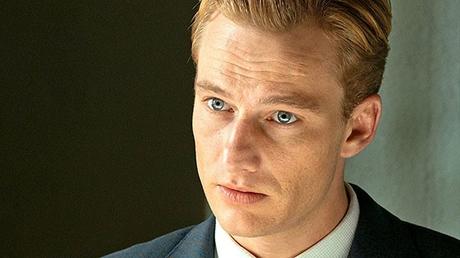 Waiting to discover this year’s winners in a few days, I’ve been watching a few of the nominated films. What about discussing one of them each day till the Oscars Show on Saturday Night? Have you read my post about The Danish Girl? Here's the second one.
Waiting to discover this year’s winners in a few days, I’ve been watching a few of the nominated films. What about discussing one of them each day till the Oscars Show on Saturday Night? Have you read my post about The Danish Girl? Here's the second one.2. Labyrinth of Lies
The year is 1958. The war has been over for thirteen years and the Federal Republic of Germany is not only recovering but even booming. But where are the Nazis? Who has ever heard of the death camps? It looks as if everything is for the best in the best of all possible worlds in this land of milk and honey... At least, until the day journalist Thomas Gnielka recognizes in the person of a teacher the former commander of the Auschwitz concentration camp... At least, until Johann Radmann, a young prosecutor, decides to investigate the case... Nobody knows it yet but this is the dawn of a new era. Even if the road to awareness will be long and rocky... (from imdb)My musings
 Like many of you I also have seen or read touching, shocking, gripping accounts of the persecution of the Jews during WWII, so I approached this film with no particular expectation. I was just curious to see the debut work of director Giulio Ricciarelli, 50, of German mother, Italian father, grown-up in Germany. Labyrinth of Lies is the German film, with a German cast, directed by the Italian-German director, nominated among the foreign movies at the Oscars. It was released here in Italy on 14th January 2016 and it gives a different point of view on the tragic story of the Holocaust, which I found refreshing. It may sound incredible, but until the beginning of the 60s very few German people knew what Auschwitz actually was, a factory of Death, and what kind of atrocities had been carried out inside that camp. “Do you want every German to ask if their father was a murderer? Why go digging?” The movie is built around these questions.How is it possible that, after the Nuremberg trials and the publication of Anne Frank’s Diary, you could ask a 20-year-old in Frankfurt in 1958 if they knew about Auschwitz and not get a response? “Labyrinth of Lies” tries to answer all those questions. The issue of mass delusion is intriguing, stimulating and gives this film the chance to be a worthy nominee at the Oscars.
Like many of you I also have seen or read touching, shocking, gripping accounts of the persecution of the Jews during WWII, so I approached this film with no particular expectation. I was just curious to see the debut work of director Giulio Ricciarelli, 50, of German mother, Italian father, grown-up in Germany. Labyrinth of Lies is the German film, with a German cast, directed by the Italian-German director, nominated among the foreign movies at the Oscars. It was released here in Italy on 14th January 2016 and it gives a different point of view on the tragic story of the Holocaust, which I found refreshing. It may sound incredible, but until the beginning of the 60s very few German people knew what Auschwitz actually was, a factory of Death, and what kind of atrocities had been carried out inside that camp. “Do you want every German to ask if their father was a murderer? Why go digging?” The movie is built around these questions.How is it possible that, after the Nuremberg trials and the publication of Anne Frank’s Diary, you could ask a 20-year-old in Frankfurt in 1958 if they knew about Auschwitz and not get a response? “Labyrinth of Lies” tries to answer all those questions. The issue of mass delusion is intriguing, stimulating and gives this film the chance to be a worthy nominee at the Oscars. 
I particularly liked the hero, idealistic public prosecutor Johann Radmann, and appreciated the measured but intense performance of Alexander Fehling. Radmann is shocked when he learns the true nature of the Third Reich’s crimes and he can't share the wish of the majority of the people around him, he can't take part in that plot of silence. He feels he has the duty to unveil the tragic, bleak reality he has got in touch with by chance. He doesn't find much help in his quest, only a local journalist will help him find a series of survivors ready to talk and to relive the shocking experiences they had been so desperately trying to forget.Both the Germans and the Jews reacted to that immense human tragedy trying to remove and forget. But forgetfulness is what, instead, we must fight, on and on, if we believe that we can learn much from past mistakes. Thanks to Giulio Ricciarelly for a thoughtful and thought-provoking movie.

